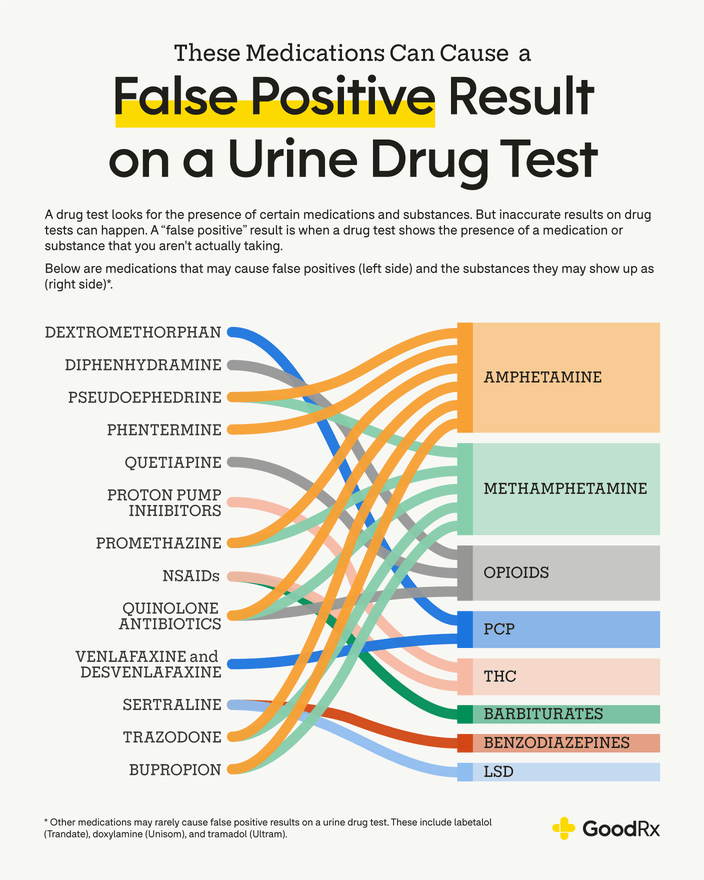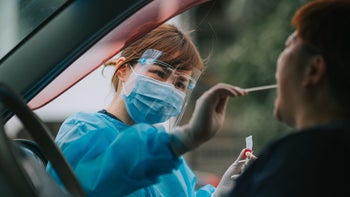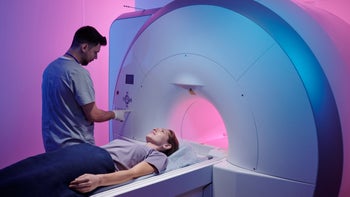
These 10 Medications Can Cause a False Positive on Drug Tests
Key takeaways:
Some medications can cause false positives on urine drug tests. This means the test shows the presence of certain substances or medications you haven’t actually taken.
Antidepressants, decongestants, and dextromethorphan (Robitussin, Delsym) are examples of medications that can cause a false positive.
If you think you’ve had a false positive on a urine drug test, talk to a healthcare professional. They may be able to run a second test to confirm whether the results were correct or inaccurate.
Table of contents
If you or your healthcare team are concerned that a substance in your body might be affecting your health, a drug test can provide helpful information. It can detect the presence of certain medications and substances in your system.
The most common type of drug test is a urine test. However, there are times when the test results may be inaccurate. For instance, a false positive is when a drug test shows the presence of a medication or substance that you didn’t actually take. But how does this happen?
Sometimes a false positive can be the result of a laboratory error. But, more often, medications are the cause of false positives. Below we'll review 10 medications that can affect the results of a drug test. We’ll also cover how urine drug tests work and other products that may cause a false positive.
Search and compare options
What’s a urine drug test?
Urine drug tests look for the presence of specific substances in the body. This includes prescription-only medications and certain illegal substances.
There are many scenarios in which might be asked to take a urine drug test, including:
You’re prescribed a controlled substance. Your healthcare professional may request a urine drug test if you're prescribed high-risk medications, such as opioids or benzodiazepines. This allows them to check for other substances that could be dangerous when combined with these medications.
It’s part of a job interview process. You may be asked to complete a drug test as a condition of employment.
It’s an employer-mandated screening. Some employers may require their employees to complete drug tests on a routine basis.
It’s part of a medical workup. A urine drug test can be part of a group of diagnostic tests during a medical emergency . A drug test is also a common part of mental health evaluations.
What does a urine drug test look for?
Many urine drug tests check for the following medications and substances:
Tetrahydrocannabinol (THC), an active ingredient in cannabis
Opiates and opioids, such as oxycodone (Roxicodone, OxyContin) and morphine (MS Contin), and heroin
Phencyclidine (PCP)
Amphetamines, such as Adderall and methamphetamine
Cocaine
Barbiturates, such as phenobarbital and butalbital
Benzodiazepines, such as alprazolam (Xanax) and lorazepam (Ativan)
Some urine drug tests screen for one specific medication or substance. These include drug tests that look for:
Tramadol (ConZip)
Methadone (Methadose)
Fentanyl (Sublimaze)
Lysergic acid diethylamide (LSD)
Methylenedioxymethamphetamine (MDMA), more commonly known as ecstasy
What causes a false positive? Lab test results can be affected by medications, foods, and other factors. Learn what impacts a false test result.
What about delta-8 THC? Delta-8 THC is a chemical in cannabis plants that’s used in manufactured cannabis products. Will it show up on a drug test?
Can you be tested for cannabis at work? Your employer may be able to make you take a marijuana drug test. It often depends on the state you live in.
Medications that may cause false positives

These medications are some of the most likely to cause a false positive on urine drug tests. But keep in mind this is not a complete list.
1. Dextromethorphan (Robitussin, Delsym)
Dextromethorphan is the main ingredient in many over-the-counter (OTC) cough suppressants. If you’ve taken dextromethorphan, a urine test may show a false positive for PCP.
2. Diphenhydramine (Benadryl)
Diphenhydramine is an antihistamine that can treat allergies, itching, and cold symptoms. Diphenhydramine may cause a false positive for some opioids. But it’s not clear what dose of diphenhydramine would cause a false positive. Typical doses of diphenhydramine may not be an issue.
Read more like this
Explore these related articles, suggested for readers like you.
Some reports have also shown that diphenhydramine may result in a false positive for PCP. But this is rare.
3. Pseudoephedrine (Sudafed)
Used to treat sinus and nasal congestion, pseudoephedrine may cause a false positive for amphetamines or methamphetamines.
4. Phentermine (Adipex-P)
Phentermine is FDA approved to help some people lose weight. Taking phentermine can cause false-positive urine test results for amphetamines.
5. NSAIDs, such as ibuprofen (Motrin, Advil) and naproxen (Aleve, Naprosyn)
Ibuprofen and naproxen are in a group of medications called nonsteroidal anti-inflammatory drugs (NSAIDs). These medications help treat fever, inflammation, and pain.
With ibuprofen and naproxen, there’s a small chance your urine test may show a false positive for barbiturates (a type of sedative) or THC.
Another NSAID, oxaprozin (Daypro), may result in a false positive for benzodiazepines.
6. Some antidepressants, such as venlafaxine (Effexor XR) and sertraline (Zoloft)
Several antidepressants can cause false-positive urine drug test results. Examples include:
Venlafaxine and desvenlafaxine (Pristiq): These antidepressants are part of a group of medications called serotonin and norepinephrine reuptake inhibitors (SNRIs). Taking venlafaxine or desvenlafaxine may result in a false positive for PCP.
Sertraline: This selective serotonin reuptake inhibitor (SSRI) may cause a false positive for LSD on a urine drug test. Sertraline may also cause a false positive for benzodiazepines.
Trazodone: This older antidepressant can be used to help people sleep. Taking trazodone may cause a false positive for amphetamines or methamphetamines.
Bupropion (Wellbutrin SR, Wellbutrin XL): Taking bupropion may lead to a false positive for amphetamines or methamphetamines.
7. Quetiapine (Seroquel)
Atypical antipsychotics like quetiapine can help treat health conditions like bipolar disorder and schizophrenia. Quetiapine can cause a false positive for opioids, specifically methadone, on a urine drug test.
8. Proton pump inhibitors, namely pantoprazole (Protonix)
Proton pump inhibitors (PPIs) can treat gastroesophageal reflux disease (GERD) and heartburn symptoms. Taking PPIs — specifically pantoprazole — may cause false-positive urine drug test results for THC.
9. Quinolone antibiotics, such as levofloxacin (Levaquin) and ofloxacin
Quinolone antibiotics treat a variety of bacterial infections. Levofloxacin and ofloxacin are the most likely quinolone antibiotics to cause a false positive for opiates on a urine drug test. Ofloxacin may also cause a false positive for amphetamines or methamphetamines.
10. Promethazine
Promethazine is part of a group of medications called phenothiazines. It can be used to help relieve nausea and vomiting. But it can cause false-positive urine test results for amphetamines or methamphetamines.
Medications that can cause false positives in rare cases
Although rare, false-positive drug tests can be caused by a few other medications. These medications include labetalol, doxylamine (Unisom), and tramadol.
Labetalol
Labetalol is part of a group of medications called beta blockers. It’s used to lower blood pressure. While rare, labetalol may cause a false positive for amphetamines or methamphetamines.
Doxylamine
Doxylamine is an OTC medication that may help people who struggle to fall asleep at night. Large doses of doxylamine can cause a false positive for opioids — specifically methadone.
Tramadol
Tramadol is an opioid medication that treats pain. Large doses of tramadol can cause a false positive for methadone or PCP.
Debunked: Does methylphenidate cause a false positive for amphetamines?
Methylphenidate (Ritalin, Concerta, Daytrana) is a stimulant medication used to treat attention-deficit hyperactivity disorder (ADHD). Many sources state that methylphenidate can cause false-positive results for amphetamines. But research shows this isn’t true. If you’re prescribed methylphenidate for ADHD, you shouldn’t have to worry about having a false positive for amphetamines.
What else, besides medications, can cause a false-positive drug test?
Products other than medications can cause a false-positive drug test. Notable examples include:
Poppy seeds: If you eat foods containing poppy seeds — like bagels, salad dressings, and crackers — it’s possible to get a false positive for codeine or morphine on a urine drug test. So it may be a good idea to avoid consuming poppy seeds for a couple days before a scheduled drug test. Though, the research in this area has looked at large quantities of poppy seeds, so it’s unclear if smaller amounts will cause a false positive.
CBD (cannabidiol) products: Some CBD products may contain THC. While not exactly a false positive, it’s good to keep in mind that these products may cause you to test positive for THC on a urine drug test.
Hemp products: Similar to CBD products, hemp products may contain varying amounts of THC. So it’s possible that hemp products, including teas and bars, could result in a positive result for THC.
If you ingest any of the above products regularly, let your healthcare professional know before taking a drug test.
What should you do if you get a false positive on a drug test?
If you think you’ve had a false positive on a urine drug test, consider whether any medications you take could be responsible. This is because several medications and substances share chemical properties. Amphetamines are some of the most common false positives for this reason.
Your healthcare professional may be able to investigate the results by running a second test. Confirmation tests check specifically for the substance or medication in question. And these tests are much less likely to show false positives.
In some cases, though, running a second test may not be possible. Talk to a healthcare professional if you’re concerned about a false positive on a urine drug test.
The bottom line
False positives on urine drug tests can happen. A false positive is when a drug test shows the presence of a medication or substance that hasn’t actually been taken.
Multiple medications can cause false-positive drug tests. Some examples include ibuprofen (Advil, Motrin), dextromethorphan (Robitussin), and certain antidepressants, including sertraline (Zoloft). If you think your urine drug test results are inaccurate, talk to a healthcare professional. They may be able to perform a second test that’s more specific and accurate.
Why trust our experts?



References
Baden, L. R., et al. (2001). Quinolones and false-positive urine screening for opiates by immunoassay technology. JAMA.
Baron, J. M., et al. (2011). The trazodone metabolite meta-chlorophenylpiperazine can cause false-positive urine amphetamine immunoassay results. Journal of Analytical Toxicology.
Breindahl, T., et al. (2012). Methylphenidate is distinguished from amphetamine in drug-of-abuse testing. Journal of Medical Toxicology.
Casey, E. R., et al. (2010). Frequency of false positive amphetamine screens due to bupropion using the Syva Emit II immunoassay. Journal of Medical Toxicology.
Cherwinski, K., et al. (2007). False methadone-positive urine drug screens in patients treated with quetiapine. Journal of the American Academy of Child & Adolescent Psychiatry.
Farley, T. M., et al. (2017). False-positive phencyclidine (PCP) on urine drug screen attributed to desvenlafaxine (Pristiq) use. BMJ Case Report.
Fraser, A. D., et al. (1998). Oxaprozin cross-reactivity in three commercial immunoassays for benzodiazepines in urine. Journal of Analytical Toxicology.
Gomila, I., et al. (2017). Cross-reactivity of pantoprazole with three commercial cannabinoids immunoassays in urine. Journal of Analytical Toxicology.
Henderson, R. (2001). Do hemp products produce a positive urine drug screen for marijuana? Emergency Medicine News.
Jensen, C. M., et al. (2018). Patients in medical treatment for attention deficit/hyperactivity disorder (ADHD): Are they at risk in drug screening? ADHD Attention Deficit and Hyperactivity Disorders.
Kale, N. (2019). Urine drug tests: Ordering and interpretation. American Family Physician.
Landy, G. L., et al. (2015). False positive phencyclidine result on urine drug testing: A little known cause. BJPsych Bulletin.
Lelievre, B., et al. (2014). Immunochromatographic tests: False-positive results for methadone and phencyclidine after acute poisoning with tramadol and dextropropoxyphene. Acta Clinica Belgica.
Logan, B. K., et al. (2010). Trazodone, meta-chlorophenylpiperazine (an hallucinogenic drug and trazodone metabolite), and the hallucinogen trifluoromethylphenylpiperazine cross-react with the EMIT II ecstasy immunoassay in urine. Journal of Analytical Toxicology.
Ly, B. T. (2012). False-positive urine phencyclidine immunoassay screen result caused by interference by tramadol and its metabolites. Annals of Emergency Medicine.
Marin, S. J., et al. (2015). One hundred false-positive amphetamine specimens characterized by liquid chromatography time-of-flight mass spectrometry. Journal of Analytical Toxicology.
MedlinePlus. (2024). Drug testing.
Melanson, S. E. F., et al. (2006). Reduced interference by phenothiazines in amphetamine drug of abuse immunoassays. Archives of Pathology & Laboratory Medicine.
Nomier, M., et al. (2004). False-positive TDxFLx urine amphetamine/metamphetamine II assay from ofloxacin. Saudi Pharmaceutical Journal.
Pourmorteza, M., et al. (2016). PPI and false-positive THC screen: False positive equal false allegation. American Journal of Gastroenterology.
Reisfield, G. M., et al. (2022). Poppy seed consumption may be associated with codeine-only urine drug test results. Journal of Analytical Toxicology.
Rengarajan, A., et al. (2013). How often do false-positive phencyclidine (PCP) urine screens occur with use of common medications? Clinical Toxicology.
Rogers, S. C., et al. (2010). Rapid urine drug screens: Diphenhydramine and methadone cross-reactivity. Pediatric Emergency Care.
Rollins, D. E., et al. (1990). Investigation of interference by nonsteroidal anti-inflammatory drugs in urine tests for abused drugs. Clinical Chemistry.
Saitman, A., et al. (2014). False-positive interferences of common urine drug screen immunoassays: A review. Journal of Analytical Toxicology.
Stout, P. R., et al. (2004). Evaluation of ephedrine, pseudoephedrine and phenylpropanolamine concentrations in human urine samples and a comparison of the specificity of DRI amphetamines and abuscreen online (KIMS) amphetamines screening immunoassays. Office of Justice Programs.
Syed, H., et al. (2009). Doxylamine toxicity: Seizure, rhabdomyolysis and false positive urine drug screen for methadone. BMJ Case Reports.
Yee, L., et al. (2011). False-positive amphetamine toxicology screen results in three pregnant women using labetalol. Obstetrics & Gynecology.




























